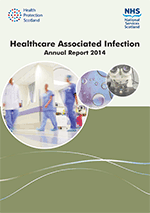Today, a report by Health Protection Scotland (HPS), shows there is still much work to be done in the fight against Healthcare Associaed Infections (HAI). Although some infection rates are decreasing (for example, surgical site infections (SSI) after caesarean section) others such as those in Intensive Care Units, Clostridium difficile and Staphylococcus aureus bloodstream infections have remained stable.
The report also highlights the internationally recognised risk of Antimicrobial Resistance (AMR). Incidence rate of E. coli bacteraemias (infections), in patients aged 65 years and above, increased significantly in the last year. E. coli antimicrobial resistance to third generation antimicrobials – cephalosporins, carbapenems and nitrofurantoin also increased significantly in the last year.
Professor Jacqui Reilly, HPS Lead Consultant in HAI and AMR and also a member of the SHIP research group at GCU said, “HPS, alongside colleagues throughout NHSScotland, continues to focus on preventing HAI, whilst some improvements have been seen in selected SSI there remains a burden of HAI requiring further reduction. The threat of antimicrobial resistance worldwide, pointed to within this report, means that we should continue to focus our prevention efforts to this end. The intelligence gathered over the last year, from the work led by HPS, is being used to prevent these avoidable infections in healthcare, saving resources, and crucially, delivering better healthcare for patients.”
This report highlights the importance of the work of the SHIP research group in exploring effective ways of preventing avoidable infections.
The full report, “Healthcare Associated Infection Annual Report 2014” can be accessed at: http://www.hps.scot.nhs.uk/haiic/publicationsdetail.aspx?id=63878
